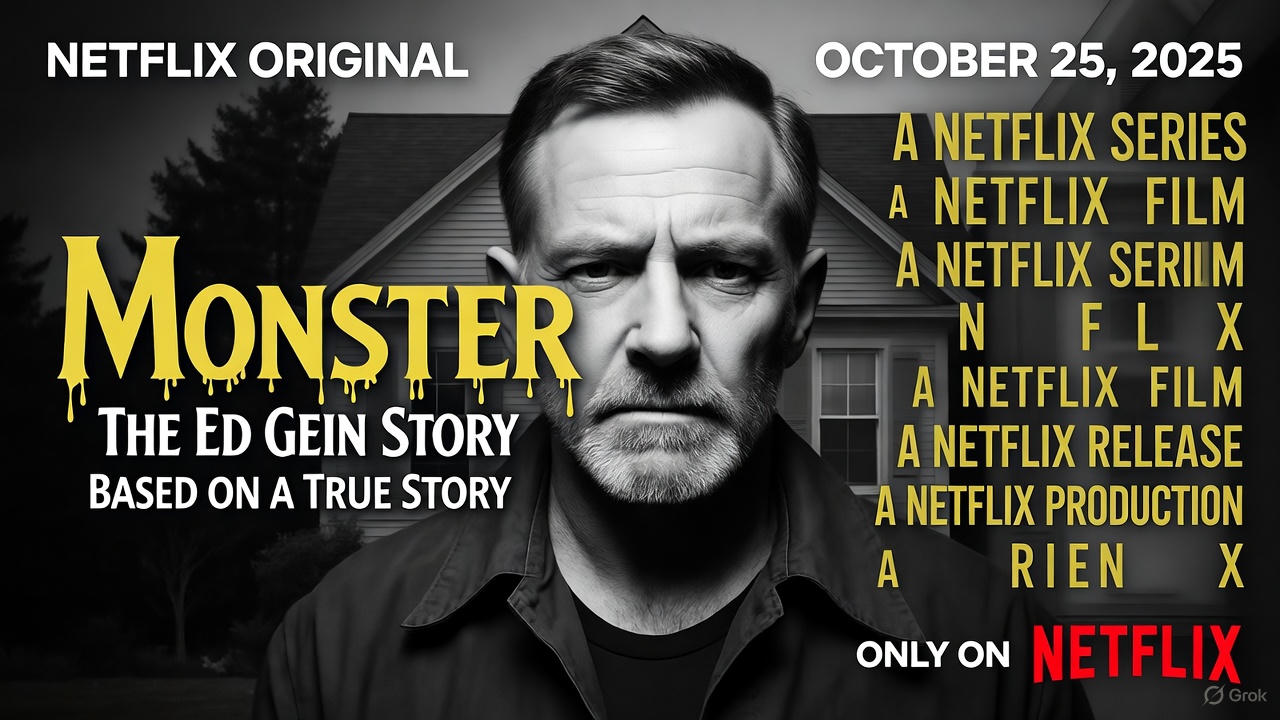In the ever-expanding universe of true-crime anthologies, Netflix’s Monster series has solidified its grip on audiences with unflinching portrayals of America’s most notorious killers. Following the binge-worthy successes of Monster: The Jeffrey Dahmer Story (2022) and Monsters: The Lyle and Erik Menendez Story (2024), the third installment, Monster: The Ed Gein Story, dropped all eight episodes on October 3, 2025, at 3 a.m. PT. Created by Ian Brennan – with Ryan Murphy stepping back as director but remaining a producer – this season catapults viewers into the frostbitten heart of 1950s rural Wisconsin, where a mild-mannered handyman named Eddie Gein (Charlie Hunnam) harbors secrets so grotesque they would birth an entire horror genre.
Ed Gein, dubbed the “Butcher of Plainfield,” wasn’t your typical serial slayer. Born in 1906 to a domineering, Bible-thumping mother named Augusta (portrayed with venomous intensity by Laurie Metcalf), Gein’s life was a pressure cooker of isolation and repression. Raised on a decaying farm alongside his alcoholic father and enabling brother, Gein’s psyche fractured under Augusta’s relentless sermons branding women as vessels of sin. After her death in 1945, Gein spiraled into a macabre obsession, exhuming corpses from local graveyards to craft “suits” from human skin and furniture from bones – a fetishistic tribute to his lost matriarch. His crimes peaked in 1957 when he murdered hardware store owner Bernice Worden, whose decapitated body was found gutted like a deer in his shed. Gein confessed to one murder but was suspected in others, including the 1953 slaying of tavern owner Mary Hogan. Deemed legally insane, he spent his final decades in a mental institution, dying in 1984. Yet, Gein’s legacy endures: Alfred Hitchcock’s Norman Bates in Psycho, Tobe Hooper’s Leatherface in The Texas Chain Saw Massacre, and even Buffalo Bill’s skin-wearing in The Silence of the Lambs all trace their twisted roots to this unassuming grave robber.
Hunnam, shedding his rugged Sons of Anarchy persona, undergoes a startling transformation to embody Gein’s eerie ordinariness. With pallid makeup, receding hairline, and a vacant stare, he captures the killer’s childlike demeanor – a “soft-spoken simpleton,” as one critic quipped – masking volcanic depravity. Metcalf steals scenes as Augusta, her pious rants dripping with manipulative fervor, while Tom Hollander lends wry gravitas as Alfred Hitchcock, whose 1960 film immortalized Gein’s horrors. Supporting turns from Vicky Krieps as a suspicious neighbor, Olivia Williams as Hitchcock’s wife Alma Reville, and Suzanna Son in a enigmatic role add layers to the ensemble, blending historical fidelity with dramatic flair. Brennan’s script, unburdened by Murphy’s stylistic excess, opts for a taut, eight-hour arc that interweaves Gein’s descent with the media frenzy post-arrest, including graphic recreations of his “house of horrors.”
Critics have been divided since the premiere. Rotten Tomatoes sits at a middling 52%, with praise for its atmospheric cinematography – those snow-swept fields evoking a frozen purgatory – and Hunnam’s nuanced vulnerability. Variety hailed it as “a blueprint for modern horror,” crediting the show’s exploration of how societal neglect forges monsters. Yet, detractors, like RogerEbert.com’s Brian Tallerico, lambast its “distracting and unconvincing” lead performance and factual liberties, such as unsubstantiated sexual depictions of victims and a gratuitous Psycho shower homage that feels like pandering. The excessive gore – think lampshades of flesh and stewed organs – has sparked debates on exploitation, with some accusing Netflix of sensationalism over sensitivity toward victims’ families.
Viewership metrics underscore the hype: It debuted at #1 globally, amassing 25 million views in its first week, surpassing the Menendez season’s sophomore surge. This isn’t just a retelling; it’s a cultural autopsy, probing how Gein’s “perverse crimes” ignited our obsession with the criminally deviant. As Hunnam noted in interviews, the goal was to humanize the inhuman, revealing how isolation and maternal idolatry can erode sanity. In an era of endless true-crime pods, Monster: The Ed Gein Story reminds us: True terror lurks not in shadows, but in the everyday facade.
Yet, for all its shocks, the series falters in depth. Subplots, like Hitchcock’s meta cameo, dilute the core narrative, stretching runtime into tedium. Factual inaccuracies – Gein never exhumed his mother, contrary to dramatized whispers – undermine authenticity, echoing criticisms of prior seasons. Still, in Netflix’s blood-soaked October lineup, it carves a niche: a cautionary tale of the monsters we make. Stream it if you dare, but brace for unease that lingers like frostbite. At 500 words, this dispatch barely scratches the surface of Gein’s abyss – much like the show itself.



